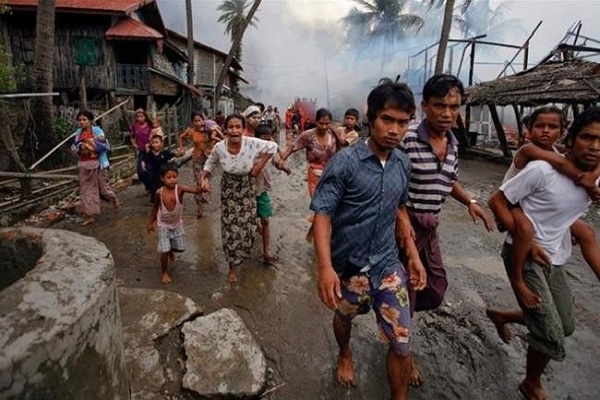Myanmar's Sham Inquiries into Rohingya Ethnic Cleansing

Government security forces burned down hundreds of their villages and raped their women and girls. More than a million Rohingya refugees are temporarily housed in neighboring Bangladesh, which has provided them safe haven.
International organizations have repeatedly demanded that Myanmar be held to account for these atrocities. The UN’s Human Rights Commission has formed an Independent International Fact-Finding Mission. The International Criminal Court and the International Court of Justice are investigating. But in Myanmar, there’s been only impunity.
Despite decades of first-person accounts of ethnic cleansing, the government of Myanmar has stoutly denied wrongdoing against Rohingyas. Instead, it has blamed the victims, accusing them of being “threats to Buddhism” or “terrorists” to justify their serious violations.
Myanmar has claimed to have examined the allegations. But its inquiries have only been for show. Myanmar’s inquiry mechanisms are neither credible nor impartial. Accountability for crimes against Rohingyas remains off limits in Myanmar.
The sham investigations date back to 2012 when anti-Muslim violence erupted in Myanmar’s northern Rakhine State. Myanmar formed the Rakhine Investigation Commission to identify the perpetrators. Instead, the commission accused Rohingyas of “fanning the flames of sectarian violence.” The Commission called for increased military and police presence.
Myanmar formed a legislative commission to examine similar violence in 2016. But again, the group called the Rakhine State Investigation Commission found no wrongdoing by the government. Instead it said that attacks on police posts in the region were “pre-planned” by dangerous dissidents. It called for tighter security “at schools and in ethnic Rakhine villages where Buddhists live.” The report did not identify any perpetrators of violence – on either side.
The next year, another group called the Maungdaw Investigation Commission headed by Myanmar’s vice president, Myint Swe, dismissed credible allegations of rape and religious persecution. Its final report refuted the findings of widespread violence against Rohingyas by the United Nations Office of the High Commissioner for Human Rights.
The Myanmar military offered its own report, also in 2017. The so-called Military Commission headed by Lt. Gen. Aye Win stated that that it had uncovered no wrongdoing except in two minor incidents. The Military Commission also said the UN’s High Commissioner for Human Rights was “totally wrong”.
The Reuters news service famously unearthed the massacre of 10 Rohingya men in the village of Inn Din in February 2018. Seven soldiers who took part in the extrajudicial executions were sentenced to 10 years in prison. But all ten were secretly released in less than a year. The reporters who documented the killings were jailed for longer than the perpetrators before they were finally released.
The last of the Myanmar commissions, completed in January this year, was probably the most sinister. The Independent Commission of Enquiry looked into attacks on Rohingyas dating back to 2017. The commission included members from the Philippines and Japan as well as from Myanmar. Nonetheless, it was as much a whitewash as its predecessors. It endorsed Myanmar's official version of events, denying well-documented allegations of genocide, ethnic cleansing and rape. It came to this conclusion without interviewing any of the Rohingya victims, survivors or witnesses who were forcibly deported to Bangladesh. That’s where the majority of such witnesses and victims had fled for their safety.
Myanmar’s many inquiries into the obvious abuse of Rohingyas have been a sham. Their goal has been impunity for the wrongdoers rather than any serious effort at fact-finding. Justice has not been served. The only hope for finding the truth lies with international organizations. Governments around the world need to endorse these efforts and keep pressure on Myanmar to allow real inquiries to proceed. The Rohingya victims and their families deserve nothing less.
By Hunter Strupp (Former Staff Director of the House Subcommittee on Asia and the Pacific)
Source: realclearpolitics.com



